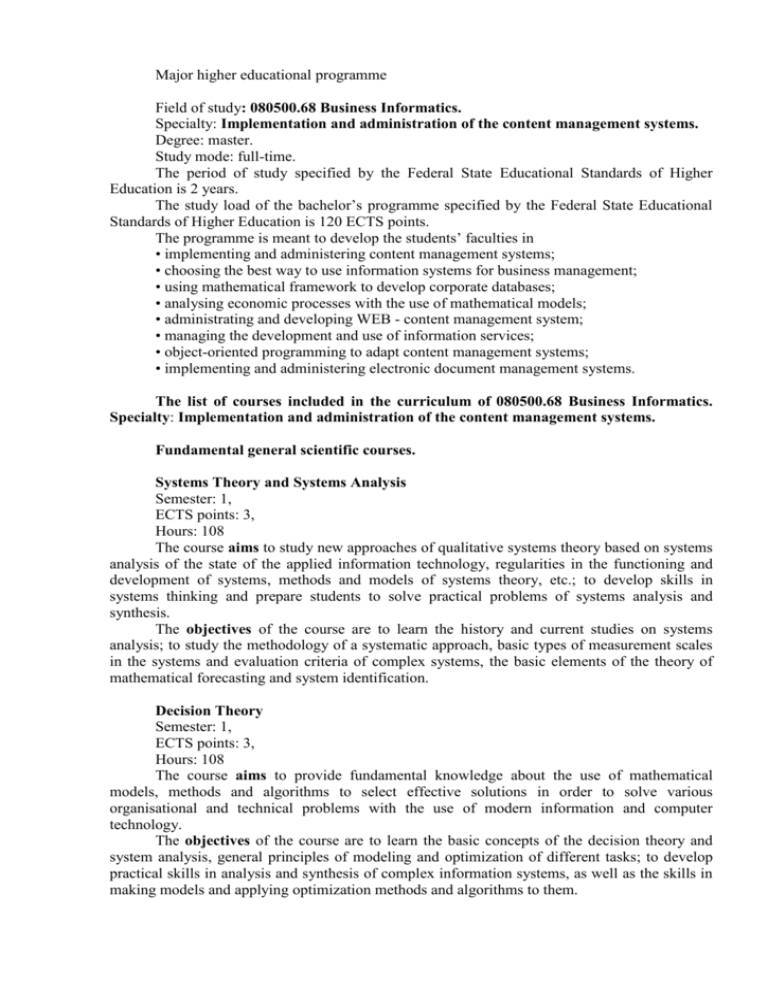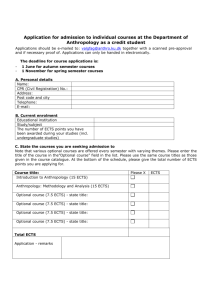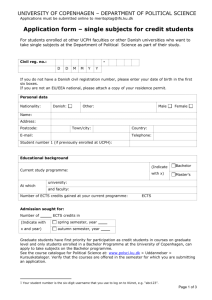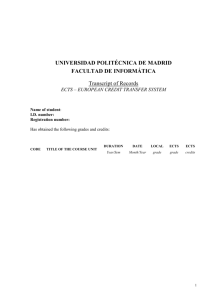Major higher educational programme Field of study: 080500.68
advertisement

Major higher educational programme Field of study: 080500.68 Business Informatics. Specialty: Implementation and administration of the content management systems. Degree: master. Study mode: full-time. The period of study specified by the Federal State Educational Standards of Higher Education is 2 years. The study load of the bachelor’s programme specified by the Federal State Educational Standards of Higher Education is 120 ECTS points. The programme is meant to develop the students’ faculties in • implementing and administering content management systems; • choosing the best way to use information systems for business management; • using mathematical framework to develop corporate databases; • analysing economic processes with the use of mathematical models; • administrating and developing WEB - content management system; • managing the development and use of information services; • object-oriented programming to adapt content management systems; • implementing and administering electronic document management systems. The list of courses included in the curriculum of 080500.68 Business Informatics. Specialty: Implementation and administration of the content management systems. Fundamental general scientific courses. Systems Theory and Systems Analysis Semester: 1, ECTS points: 3, Hours: 108 The course aims to study new approaches of qualitative systems theory based on systems analysis of the state of the applied information technology, regularities in the functioning and development of systems, methods and models of systems theory, etc.; to develop skills in systems thinking and prepare students to solve practical problems of systems analysis and synthesis. The objectives of the course are to learn the history and current studies on systems analysis; to study the methodology of a systematic approach, basic types of measurement scales in the systems and evaluation criteria of complex systems, the basic elements of the theory of mathematical forecasting and system identification. Decision Theory Semester: 1, ECTS points: 3, Hours: 108 The course aims to provide fundamental knowledge about the use of mathematical models, methods and algorithms to select effective solutions in order to solve various organisational and technical problems with the use of modern information and computer technology. The objectives of the course are to learn the basic concepts of the decision theory and system analysis, general principles of modeling and optimization of different tasks; to develop practical skills in analysis and synthesis of complex information systems, as well as the skills in making models and applying optimization methods and algorithms to them. Compulsory general scientific courses. Mathematical Modeling of Economic Processes Semester: 1, ECTS points: 3, Hours: 108 The course aims to inform students about the basics of analysis and synthesis of economic processes, systems structures and some subsystems, control systems, decision support systems. The objectives of the course are to prepare students for scientific and practical work on the development of mathematical models of the economic systems and conduct research with these models. Elective general scientific courses. Optimization Techniques Semester: 1, ECTS points: 3, Hours: 108 The course aims to study optimization techniques to form knowledge and skills in formulation and solution of optimization problems. The objectives of the course are to form an understanding of the basic principles underlying the methods for solving optimization problems; to acquire practical skills in using the basic types of information systems and applications of general purpose to solve practical problems of optimization; to build skills in formalized description of optimization problems, mathematical modeling, interpretation of results of a decision. Project Management Semester: 1, ECTS points: 3, Hours: 108 The course aims to form a system of knowledge about the role of a project in an organization, modern concept of project management, project management techniques with the use of economic mathematical methods. The objectives of the course are to study market-based approach in the system of economics planning of project implementation; to examine the techniques of decisions analysis and synthesis to make effective management decisions; to study methodological principles of project risk management. Fundamental field-oriented courses. Enterprise Architecture (Advanced Level) Semester: 1, ECTS points: 3, Hours: 108 The course aims to form a theoretical knowledge of the enterprise architecture in order to form practical skills in modeling business processes, designing information systems architecture and optimizing the structure of an enterprise. The objectives of the course are to teach how to use modern tools of the information systems, as well as information systems for business management, software techniques to automate financial and economic activities at an enterprise. Lifecycle Management of Information Systems (Advanced Level) Semester: 1, ECTS points: 3, Hours: 108 The course aims to study the modern principles of lifecycle management of information systems: creating reliable, high-quality software that meets standard requirements for information systems; to form an understanding of the need to apply these principles. The objectives of the course are to teach to formulate the requirements for lifecycle management of information systems including information systems architecture for informatization of enterprises; to develop information systems in order to solve applied problems, to estimate the complexity of algorithms and programmes, to use modern technology of information systems programming, testing and documenting at the international and national levels. Scientific Seminar “Introduction and Administration of Web CMS” Semester: 1-2, ECTS points: 4, Hours: 144 The course aims to give an idea about the theoretical and methodological approaches to introduction and administration of modern website content management systems. The objectives of the course are to study all stages of the initial installation and basic configuration of a web content management system; to form an idea how to administer a website built on a content management system; to learn how to create and modify the site structure and content; to develop and install a template of web design. Compulsory field-oriented courses. Development of Corporate Database Semester: 1, ECTS points: 4, Hours: 144 The course aims to study the fundamental knowledge in the field of database theory and to form practical skills in applying this knowledge when creating software to process information using database management systems. The objectives of the course are to get the basic theoretical and practical knowledge about how to make databases, about methods and techniques to process information stored in databases; to develop practical skills in using a variety of database management systems that give a user a range of functional and service capabilities to create databases, enter information into them, correct and process it. Content Management Systems Semester: 1-2, ECTS points: 4, Hours: 144 The course aims to provide knowledge about the current trends and content management systems. The objectives of the course are to study the types of content, processes of lifecycle management of digital content, creation and use of information services (content services). Object-Oriented Programming Semester: 2, ECTS points: 4, Hours: 144 The course aims to learn the theoretical basics of object-oriented programming and build practical skills in applying this knowledge in order to create modern software products. The objectives of the course are to describe the theoretical fundamentals of objectoriented programming with examples in C++; to study the characteristics of object-oriented programming in C++; to develop practical skills in using classes and objects of standard template library (STL); to develop practical skills in developing the class hierarchy to solve applied problems. Development of WEB Content Management System Semester: 2, ECTS points: 3, Hours: 108 The course aims to give an idea of the architecture and development techniques of Web content management systems, as well as application of individual modules used to make webbased systems. The objectives of the course are to study the basic concepts of web content management; to install 1C-Bitrix CMS on the local computer; to learn to run basic operations and work with the interface; to learn the basics of CMS administration and configuration using information blocks and components. Information Systems of Financial Analysis and Bookkeeping Semester: 2, ECTS points: 5, Hours: 180 The course aims to form the theoretical knowledge and practical skills in making, implementing, running, applying information systems and information technology in the field of financial analysis and bookkeeping. The objectives of the course are to teach the basic skills in working with the local network; to navigate easily in the information space in the Internet; to learn to create computer models of economic processes, to conduct computer experiments with a model, to use a database management system at work. Business Foreign Language Semester: 1-2, ECTS points: 4, Hours: 144 The course aims to improve the skills of oral and written communication for active use in professional and scientific activities, as well as for business contacts with foreign partners and for further self-education. The objectives of the course are to develop the skills to make grammatically correct statements; to build the skills in translating scientific literature on specialty and business communication, as well as skills to make monologue statements on professional topics (papers, reports, presentations). Elective field-oriented courses. Cloud Technology Semester: 2, ECTS points: 4, Hours: 144 The course aims to acquire theoretical knowledge and practical skills in the architecture of “cloud” technology, methods and design features of “cloud” services, as well as skills to work with the main existing “cloud” platforms. The objectives of the course are to study the basic characteristics of the “cloud” technology, main differences from solutions based on server technology, benefits and risks associated with the use of “cloud” computing, as well as the prerequisites for the transition to the “cloud” infrastructure and use of “cloud” services; to familiarise with the existing solutions based on “cloud” technology, as well as major suppliers of “cloud” platforms. Current Issues in Applied Mathematics Semester: 2, ECTS points: 4, Hours: 144 The course aims to familiarise with the basic methods of design and analysis of complex mathematical models and algorithms to study the mathematical models with the use of computers. The objectives of the course are to give an overview of some current scientific problems in applied mathematics and computer science, as well as current methods, approaches and tools to solve these problems. E-commerce Semester: 2, ECTS points: 5, Hours: 180 The course aims to form a systematic approach to the theoretical fundamentals and practical skills in conducting e-commerce as an integrated direction covering an extensive range of business issues and information technology. The objectives of the course are to study the theoretical basics of modern typologies of ecommerce; to acquire the theoretical knowledge and practical skills in both hardware and software used in e-commerce; to build skills to assess the effectiveness of projects related to ebusiness. Modern Business Computer Technology Semester: 2, ECTS points: 5, Hours: 180 The course aims to familiarise with special computer technology applied in research, as well as in education; to prepare scientists and teachers highly qualified in the field of modeling and creating specialized software to solve applied problems in various spheres of life. The objectives of the course are to demonstrate how modern technology is changing external and internal environment of any sphere of human life, modern concepts and standards of corporate information systems; to provide the theoretical knowledge and practical skills in assessing economic efficiency of information technology; to give an idea about the information services market. Corporate Computer Network Semester: 2, ECTS points: 5, Hours: 180 The course aims to teach how to design, adjust, and support the corporate networks. The objectives of the course are to widen students' knowledge about modern network technologies, particularly network creation, administration and security; to teach how to locate and eliminate errors in the network. Business Process Management Semester: 2, ECTS points: 5, Hours: 180 The course aims to form the theoretical knowledge and practical skills in developing, making and implementing organization management decisions aimed at ensuring the smooth operation of the production system, establishing the main production processes, providing a manufacturing enterprise with all necessary theoretical information. The objectives of the course are to study the structure and content, construction and analysis of the concept “business process”, the need for its rational organisation; to familiarise with the basics of launching production processes, their features and application; to teach contemporary approaches to manage the organisation.






